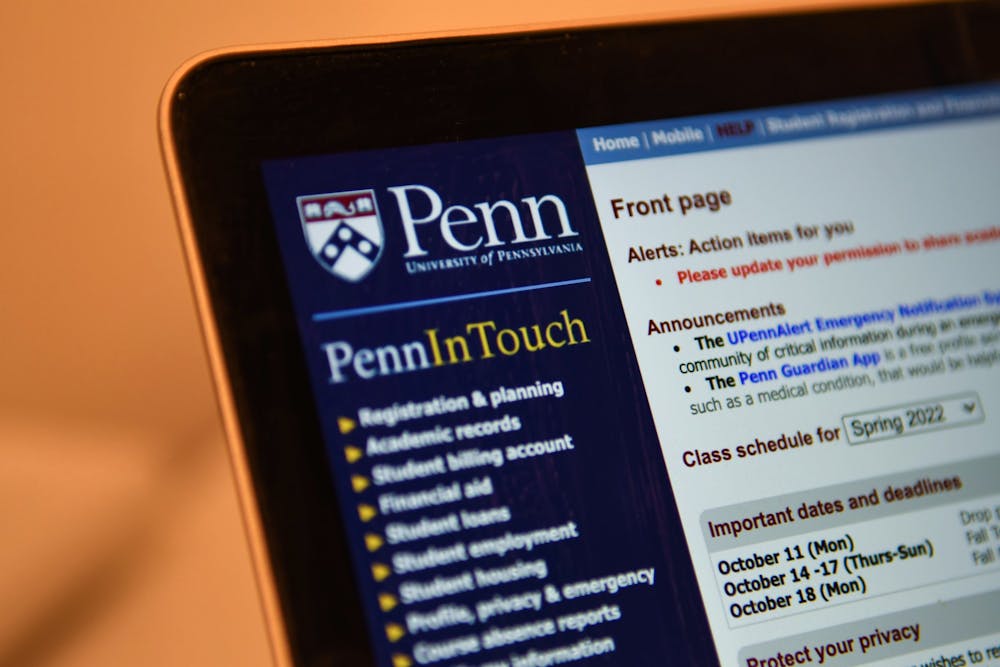
The long-awaited replacement to Penn InTouch, Path@Penn, is set to launch on March 14 in time for summer and fall 2022 course registration.
Path@Penn is set to contain a number of improvements to the outdated Penn InTouch system, including a cleaner interface, mobile device compatibility, and the ability to swap courses instead of adding and dropping courses. The rollout of the new system faced several delays — Path@Penn was originally set to be released at the end of 2020, but was delayed until 2021, and then delayed again, as COVID-19 threatened to disrupt plans.
Penn InTouch will remain online until June 2022 to manage spring courses, Executive Director for Academic Technology and Planning Rob Nelson said.
“You’ll still be using Penn InTouch for everything that happens in the spring," Nelson said. "So if you’re dropping a class, even after March, you won’t go into the new system to do that. You’ll still be going into Penn InTouch because all that information about your current registration is being held in the old system."
Nelson said Path@Penn was explicitly designed to work on mobile devices, unlike Penn InTouch, which was deemed so difficult to use on cell phones that a student developed an app in 2018 to make mobile usage less challenging.
Students will now be able to “swap” classes through Path@Penn during the course selection period instead of first dropping a course, then adding a different one. The current practice of adding and dropping classes on Penn InTouch is risky, Nelson said, because if a class suddenly opens and a student drops a course to claim it, both the desired class and the dropped class could close if the student isn't fast enough, forcing them to look elsewhere for credits.

Another update is that Path@Penn will be able to recognize a student’s major and allow them to register for courses reserved for their major, eliminating the need for a permit. There will still, however, be courses that require permits, such as in situations where a class is closed but the professor is still accepting select students.
Path@Penn will also continue to update and improve after its launch, Nelson said. One future update will introduce waitlists for closed courses, which Nelson said could not be accomplished prior to launch because of the need to first consolidate differing waitlist procedures from different departments.
Path@Penn is part of Penn's larger Next Generation Student System program, which is introducing a variety of new applications in its mission to “deliver superior tools and processes so students — and those who teach, advise, and support them — can perform academic and financial tasks easily and effectively.” NGSS’s ventures have included the release of the University Catalog, a guide to courses and academic programs made available online to students.
The NGSS project has considered the input of numerous advisory committees, including the Student PATH Advisory Group. This group meets roughly once per month and features representatives from numerous student government organizations, like the Undergraduate Assembly, the Student Committee on Undergraduate Education, and the Graduate and Professional Student Assembly, as well as the Transfer Student Organization and Penn Labs.
College junior Sara Whitelaw, who represents TSO on the committee, said she is pleased with the NGSS updates, including those involving XCAT — Penn’s External Course Approval Tool, through which transfer credit is granted — and said that the University officials the committee has met with have been receptive to the advisory group’s input.
“We can collaborate with administration and they can really hear students’ points of view and perspectives,” Whitelaw said.
Engineering junior Charles Cunningham, however, who participates in the advisory group as a Penn Labs representative, expressed concerns about the overhaul’s effect on Penn Labs products, including Penn Course Review and Penn Course Alert, which may not be functional for the summer 2022 term. Penn Course Review is a guide to course selection that provides numerical ratings for courses and professors through end-of-semester course evaluations conducted by the Provost's Office, and Penn Course Alert enables students to sign up to receive a notification when a desired course opens.
Penn Labs will need to rebuild its application programming interface — which allows Penn Course Review and Penn Course Alert to keep track of course openings — to be compatible with Path@Penn. Nelson said these programs will hopefully be functional in time for fall 2022 course registration.
There will be an information session and live demonstration for students to learn more about Path@Penn on Oct. 29.
The Daily Pennsylvanian is an independent, student-run newspaper. Please consider making a donation to support the coverage that shapes the University. Your generosity ensures a future of strong journalism at Penn.
Donate






